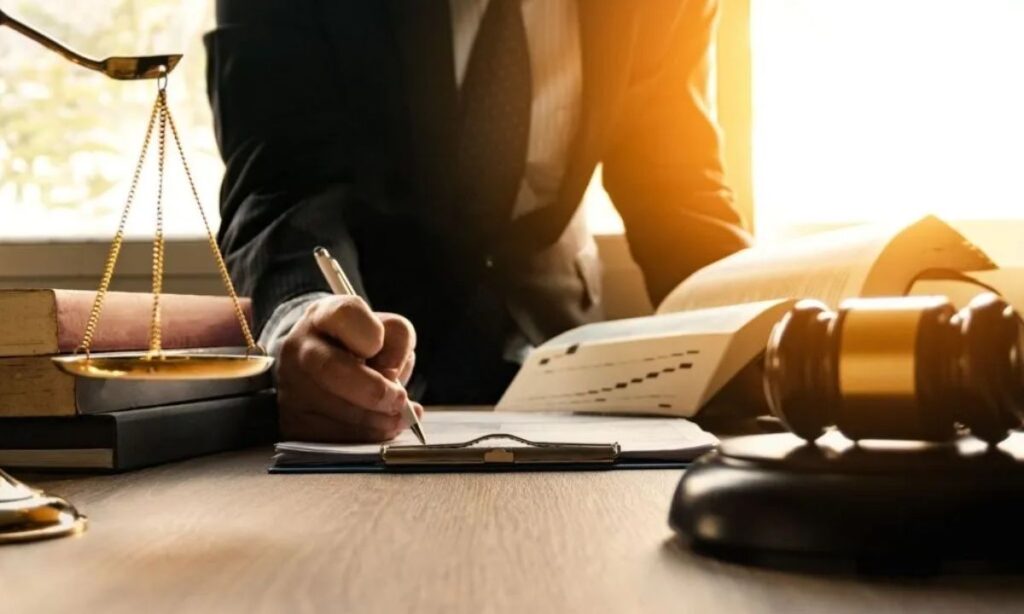The law is changing in the digital age. New technologies like the internet, AI, and blockchain are affecting how we create and follow rules. These changes bring new challenges, such as cybercrime and data privacy, that need to be addressed.
As technology grows, law schools need to prepare students for these issues. Teaching about digital contracts and cybersecurity helps future lawyers understand their responsibilities. By learning these topics, they can protect people’s rights and ensure fairness in our connected world.
The Digital Transformation of Law
The digital transformation of law is changing how legal services are delivered. Technologies like AI, legal automation, and digital contracts improve efficiency and make it easier to manage data privacy and compliance with laws.
The Rise of Legal Technology and Automation
Legal technology is growing fast. Tools like AI help lawyers do their jobs better. Automation saves time and makes work easier. This change is called digital transformation. It helps law firms stay modern and efficient.
How Artificial Intelligence is Transforming Legal Processes?
Artificial Intelligence (AI) is changing legal processes. It can sort documents quickly and find important information. AI helps lawyers with research and drafting contracts. This makes work faster and more accurate, improving overall legal services.
Legal Automation and Its Impact on Traditional Law Firms
Legal automation affects traditional law firms. Many firms now use technology to handle tasks like billing and case management. This shift allows lawyers to focus on important work. It helps them compete in a tech-driven world.
Artificial Intelligence and the Law
AI and the law are connected. AI systems can analyze data and predict outcomes. However, there are legal questions about using AI. Issues like accountability and fairness in AI must be addressed to ensure justice.
Liability in AI-Driven Decision Making
With AI making decisions, who is responsible? Liability in AI-driven choices is a big topic. If an AI makes a mistake, it raises questions about accountability. Laws need to be clear to protect everyone involved.
AI Ethics and Bias Legal Implications
AI can sometimes be biased, which is unfair. Ethical AI is important in legal matters. Lawyers must consider how AI affects people’s rights. Laws on fairness and transparency help ensure that AI is used responsibly.
Data Security and Privacy in the Digital Age

Data security and privacy in the digital age are crucial for protecting personal information. With laws like GDPR, organizations must ensure data processing is safe and that they meet privacy standards to prevent data breaches and cyber threats.
Understanding GDPR and Global Privacy Laws
GDPR stands for General Data Protection Regulation. It is a law in Europe that protects people’s data. This law helps ensure privacy and gives individuals rights over their information. Other countries have similar laws to support data security.
The Role of GDPR and Other Landmark Regulations
GDPR plays a big role in privacy laws around the world. It sets high standards for data protection. Other landmark regulations, like the CCPA in California, also help protect personal information. Together, they promote fairness and transparency in data handling.
Challenges of Cross-Border Data Protection and Jurisdiction
Cross-border data protection can be tricky. Different countries have various laws about data privacy and security. Jurisdiction issues arise when data moves across borders. This makes it hard to ensure everyone follows the same rules for protecting personal data.
Data Sovereignty and National Security Concerns
Data sovereignty means that data is controlled by the country it is created in. This is important for national security. Countries want to protect their citizens’ information from outside threats. Strong laws help ensure data stays safe within borders.
Intellectual Property in the Information Age
Intellectual property in the information age protects creations like inventions, art, and music. With digital IP laws, such as copyright and trademarks, creators can safeguard their work from unauthorized use and ensure fairness in sharing content online.
The Impact of Technology on Intellectual Property
Technology greatly affects intellectual property rights. New tools make it easier to create and share content. However, this also leads to more copyright violations. Protecting digital creations is important to ensure fairness and respect for creators’ rights.
Protecting Intellectual Property in the Digital Era
Protecting intellectual property in the digital era is challenging. Online sharing can lead to unauthorized use of music, art, and inventions. Laws like copyrights help safeguard these creations, ensuring that artists and inventors receive credit and compensation for their work.
Copyright, Fair Use, and Digital Rights Management
Copyright protects original works, allowing creators to control their use. Fair use lets people use parts of works for education or criticism without permission. Digital rights management (DRM) helps enforce these rights, preventing illegal copying and sharing of content.
Intellectual Property in the Context of Open-Source and Creative Commons
Open-source and Creative Commons licenses allow free use of certain works. These licenses help share knowledge and creativity while still protecting creators’ rights. They encourage collaboration and innovation, making it easier for people to build on existing ideas.
The Future of Intellectual Property in the Digital Era
The future of intellectual property in the digital era is evolving. As technology advances, new challenges arise for protecting creations. Laws must adapt to ensure fairness, support innovation, and address issues like copyright infringement in the online world.
Blockchain’s Impact on Intellectual Property and Ownership

Blockchain technology is changing how we think about intellectual property and ownership. It allows creators to prove they own their work, like art or music, securely. This helps protect their rights and prevents others from stealing their ideas.
With blockchain, every transaction is recorded and cannot be changed. This means that ownership can be easily tracked and verified. As a result, artists and inventors can sell their work confidently, knowing their rights are protected in the digital world.
Cybersecurity and Legal Accountability
Cybersecurity and legal accountability are essential for protecting data and systems from cyber threats. Organizations must follow laws and regulations to ensure security, and they can be held responsible for breaches if they fail to implement proper cybersecurity measures.
Evolving Cybersecurity Regulations and Standards
Cybersecurity regulations and standards are constantly changing. New laws help protect personal data and prevent cyberattacks. Organizations must stay updated to comply with these rules, ensuring they keep their systems safe and maintain trust with their users.
Determining Legal Liability for Data Breaches
When a data breach happens, it’s important to find out who is responsible. Legal liability means being accountable for failing to protect data. Companies must have strong security measures in place to avoid penalties and protect their customers’ information.
Challenges in Cybersecurity Laws and Regulations
Cybersecurity laws face many challenges. Rapid technology changes make it hard to create effective rules. Additionally, different countries have various regulations. This can lead to confusion, making it difficult for organizations to ensure they comply with all laws.
Blockchain and Digital Contracts
Blockchain technology is changing how digital contracts are created. These contracts are secure and transparent, making them harder to alter. Using blockchain can help ensure that agreements are honored and protect the rights of all parties involved.
The Rise of Smart Contracts: Blockchain and Law Integration
Smart contracts are self-executing agreements on blockchain. They automatically enforce conditions when terms are met. This innovation simplifies legal processes and reduces the need for intermediaries, making transactions faster and more reliable in the digital age.
Legal Challenges of Smart Contracts
Smart contracts come with legal challenges. Questions about enforceability and liability arise when using them. Laws need to adapt to address these issues and ensure that smart contracts are recognized and protected in legal systems worldwide.
The Role of International Agreements in Law Harmonization
International agreements play a key role in harmonizing laws between countries. They help create common rules for issues like data privacy and cybersecurity. By agreeing on these laws, countries can work together better and protect people’s rights globally.
These agreements, such as the Budapest Convention, set standards for legal cooperation. They guide nations in handling cybercrime and sharing information. By having similar laws, countries make it easier to address digital challenges and ensure a safer online environment for everyone.
Law’s Prospects in the Information Age
Law’s prospects in the information age are bright but challenging. Technology is changing how laws are created and enforced. Lawyers need to adapt to new tools like AI and digital contracts to better serve their clients and protect their rights.
Law schools are responding by updating their training programs. They now teach subjects like data privacy, cybersecurity, and tech law. This prepares future legal practitioners to handle modern issues and understand the ethical concerns that come with technology in the legal field.
Law Schools and Future Training for Legal Practitioners

Law schools are changing to meet the needs of the modern world. They now teach important topics like data privacy, cybersecurity, and digital law. This helps future lawyers understand how technology affects legal practices and client rights.
Training also includes hands-on experience with new tools. Students learn to use software for legal research and case management. By preparing them for the digital age, law schools ensure that new practitioners are ready to face today’s legal challenges effectively.
Anticipating Ethical and Social Implications
Anticipating ethical and social implications is crucial in the digital age. As technology evolves, it brings new challenges, such as data privacy and algorithm bias. Lawyers must consider how their decisions impact individuals and society to ensure fairness and justice.
READ THIS ARTICLES:“Laura Najm Net Worth in 2024 | Career: How She Achieved Millions!”
Understanding these implications helps legal professionals make responsible choices. Law schools teach students to think critically about the effects of technology on people’s rights. By focusing on ethics, future lawyers can build trust and protect the interests of everyone in a rapidly changing world.
The Evolution of Law in the Digital Information Age
The evolution of law in the digital age is important. Technology changes how laws are made and enforced. New issues like cybercrime and data privacy need updated laws to protect people’s rights online.
Laws must adapt to keep up with digital tools. This includes rules for social media and online security. By evolving, the legal system can address modern challenges and ensure fairness in a connected world.
Frequently Asked Questions?
What is cybercrime?
Cybercrime is illegal activity online, like hacking and identity theft.
Why is data privacy important?
Data privacy protects personal information and gives people control over their data.
What are digital contracts?
Digital contracts are online agreements that are legally binding and easy to sign.
How does technology affect the law?
Technology changes how laws are made and introduces new challenges, like cybercrime.
What is the role of law schools in the digital age?
Law schools teach students about technology-related legal issues to prepare them for the future.
Conclusion
The law is evolving in the digital age. New technologies like AI and blockchain change how we create and enforce laws. Law schools need to teach students about data privacy, cybersecurity, and digital contracts. Understanding these topics helps future lawyers make ethical decisions.
International cooperation is also key to creating fair laws that protect everyone’s rights. By adapting to these changes, the legal system can ensure justice and security in our connected world. This way, we can build a safer and more trustworthy digital environment for everyone.

David is a seasoned SEO expert with a passion for content writing, keyword research, and web development. He combines technical expertise with creative strategies to deliver exceptional digital solutions.







